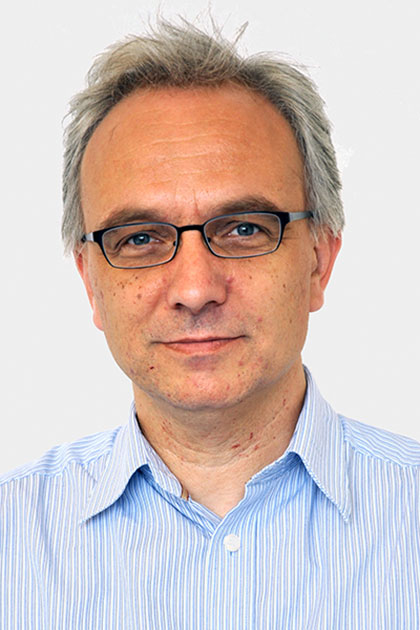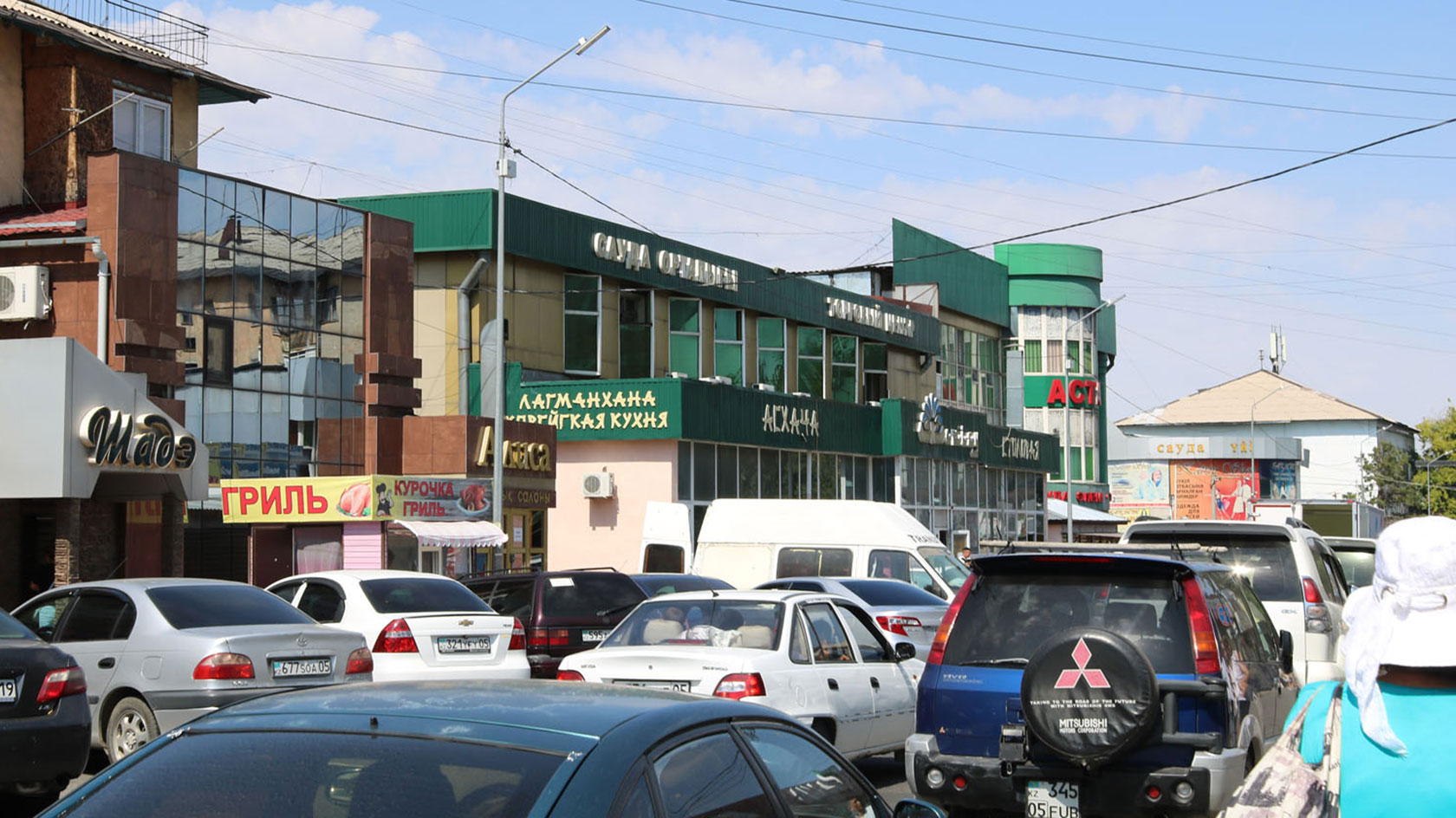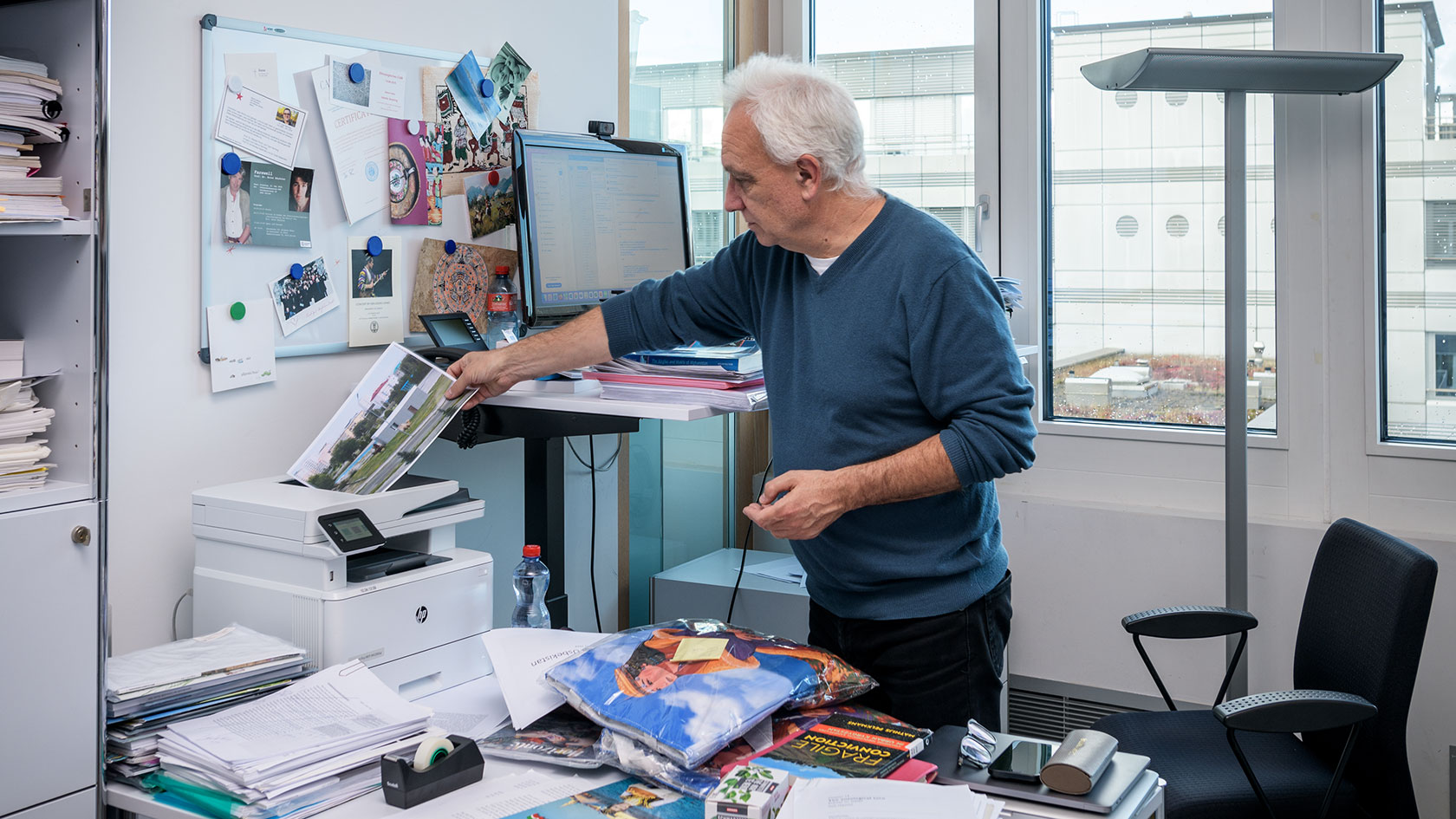New Dawn in the Land of Seven Rivers
One of UZH’s more exotic outliers is located in Taldykorgan in the south-east of Kazakhstan. This town close to the Chinese border is home to the Center for Eurasian Studies, which was opened by Peter Finke in autumn 2022. The center is, more accurately described, a single office room at Zhetysu University, which is an important project partner for Finke. A highly experienced ethnologist, Finke has worked in Central Asia for over 30 years and has spent much of this time in the vast steppes of Mongolia. Now he is focusing his attention on Mongolia’s southern neighbor – more specifically the seven rivers territory of Kazakhstan.
Like under a magnifying glass
The region derives its name from the rivers that flow across the plain and form the basis for a flourishing agronomy. This area on the edge of Kazakhstan – which is 65 times the size of Switzerland – offers a perfect opportunity to examine what happens when an existing system implodes and is replaced by a market economy. “As if gazing through a magnifying glass, we’re able to observe how new social structures, ownership terms and patterns of trade are established when societal conditions change,” says Finke. In this joint project with European partner universities Finke is focusing on how people deal with loss of trust and legal uncertainty under “precarious circumstances”.
From disaster to boom
Kazakhstan, like other countries in Central Asia, has been through turbulent times. Formerly a republic of the Soviet Union, it gained independence in 1991. “The transition to a market economy was a disaster, like everywhere in the region,” says Finke, who was already visiting the country back then. The agrarian and industrial structures established by the Soviets literally fell apart, rampant inflation took hold and the population became impoverished. Russians and other Europeans that were living there emigrated back to their home countries. From one day to the next, everything that had held true for decades no longer applied. Although the planned economy hadn’t delivered economic prosperity, it had provided a certain stability and a clear order, albeit an authoritarian one.
Dealing with new opportunities
It took time for Kazakhstan to recover from the shock of the dissolution, but from 2005 onwards the country experienced a first economic upturn. The boom was driven by the enormous oil reserves around the Caspian Sea, which were tapped with the help of western oil companies. Foreign currency flowed into the country, the infrastructure was developed, some cities prospered and many of those living in the Kazakh diaspora returned.
Kazakhstan has since become a “moderately affluent” country, as Finke says, despite the Ukraine crisis and high inflation. “What interests me is the question of what exactly happens in a boom area like the seven rivers region.” For once, it’s not impoverishment and instability that he’s focusing on, but how people are dealing with the new possibilities that have opened up in rural areas. In collaboration with colleagues at Zhetysu University, Finke’s associates are studying a specific district consisting of ten municipalities. The researchers are looking at how people are developing new agrarian structures and organizing land distribution, how they obtain loans and what informal networks they’re making use of – in brief, what opportunities and difficulties they are confronted with in their economic activities.
Risky land acquisition
The project sounds unspectacular but is of great interest due to the historic situation and societal circumstances, Finke explains. Regarding land ownership, it’s worth noting that Kazakhstan is a former nomadic country in which land isn’t treated as private property. During the Soviet era, land rights were issued to the communally cultivated kolkhozes. After the collapse, usable farmland was handed over to the population – divided into small plots of one or two hectares per person. To this day, there are no land-related property rights, only long-term lease agreements. Anyone wanting to engage in larger-scale agricultural production has to get hold of the necessary 10 to 50 hectares of land from other families in the village. Only then is it worth producing cash crops for the market, such as sugar beet, alfalfa or clover. In view of Chinese demand, the cultivation of soy beans is also popular.
“But due to the uncertain legal situation, acquiring land comes with considerable risks,” Finke explains. Who knows whether the lease agreement with the neighbor will last? These uncertainties also persist when it comes to obtaining loans. On the one hand loans are expensive and difficult to secure, on the other hand there’s a high risk that they are suddenly terminated. “Insecure lease agreements and loans are the problems most commonly cited by the citizens in our studies,” Finke explains. This year, farmers also had to cope with extreme drought and lack of rainfall, which led to crop failures.
Dramatic loss of trust
In addition to the legal and climatic unpredictability, people are also experiencing societal instability. The downfall of the Soviet state hasn’t just weakened the political system, the social system has also suffered. Rebuilding the informal rules that define interpersonal relationships is something Kazakh society is still struggling with today, says Finke. Though only few want to return to a Soviet state system, people are finding the lack of benchmarks difficult to deal with. This is especially affecting business relationships and the way in which people cooperate. “We’re noticing a general sense of insecurity,” Finke states. In a society where social disparities are increasing due to the economic boom, this insecurity is leading to a loss of trust between people. This hampers cooperative behavior. “Often it’s not clear which social norms are supposed to apply in business transactions,” the ethnologist elaborates. Can I trust my neighbor? Is my cousin supporting my family’s interests? The loss of networks has created a vacuum for which no replacement has yet been found and which is hindering economic development.

When I join in with the work on the field or take part in village meetings I learn far more about people’s social relationships and everyday worries than if I just ask them about it.
Showing off wealth
A very visible sign of the difficult and complex developments is the ostentatious display of wealth. It’s another phenomenon that can be observed in many areas of former socialist countries which have attained a certain level of prosperity. Those who’ve made it want to show off their success – be it with palatial houses or opulent celebrations. Weddings, for example, often include several hundred guests and the celebration can go on for days. Guests are catered for with immense amounts of meat, an expression of affluence.
Over the course of his extensive field work in Central Asia, Peter Finke has used a mode of practice referred to as “participatory observation”. “We don’t just listen to what people are saying in response to our questions, we also become involved in their day-to-day lives.” This means Finke’s team members try to be present when land lease agreements are negotiated, help with the sowing or harvesting and accompany people to the market. “When I join in with the work on the field or take part in village meetings I learn far more about people’s social relationships and everyday worries than if I just ask them about it,” Finke explains. What someone describes in a formal conversation and how they act in real life are often two different things.
Spending time together
Working in this way is only possible if the researcher spends a lot of time engaging with people and more or less becomes part of their family. This requires knowledge of the local languages. Fink, who studied Turkology, is fluent in five languages. In addition to German and English he speaks Turkish, Kazakh and Mongolian as well as a bit of Russian, and he has a basic knowledge of various other Turk languages. Over the years, Finke has learned a lot about the way of life and mentality of the people who live in the vast territories of Central Asia. He remembers discussions about the best form of transport – horse or motorbike. Locals explained the advantages of the animal: firstly, it takes care of its own petrol, i.e. by grazing, and secondly it will always find its way home in an emergency. Which prompted Finke to learn to ride. These days, however, he has less time available for this kind of embedded observation. Finke can only invest one or two summer months into the project in Kazakhstan, but two postdoctoral researchers and local partners are there for extended periods and drive forward the research. Their base for this pioneering work is the unspectacular office at Zhetysu University.

